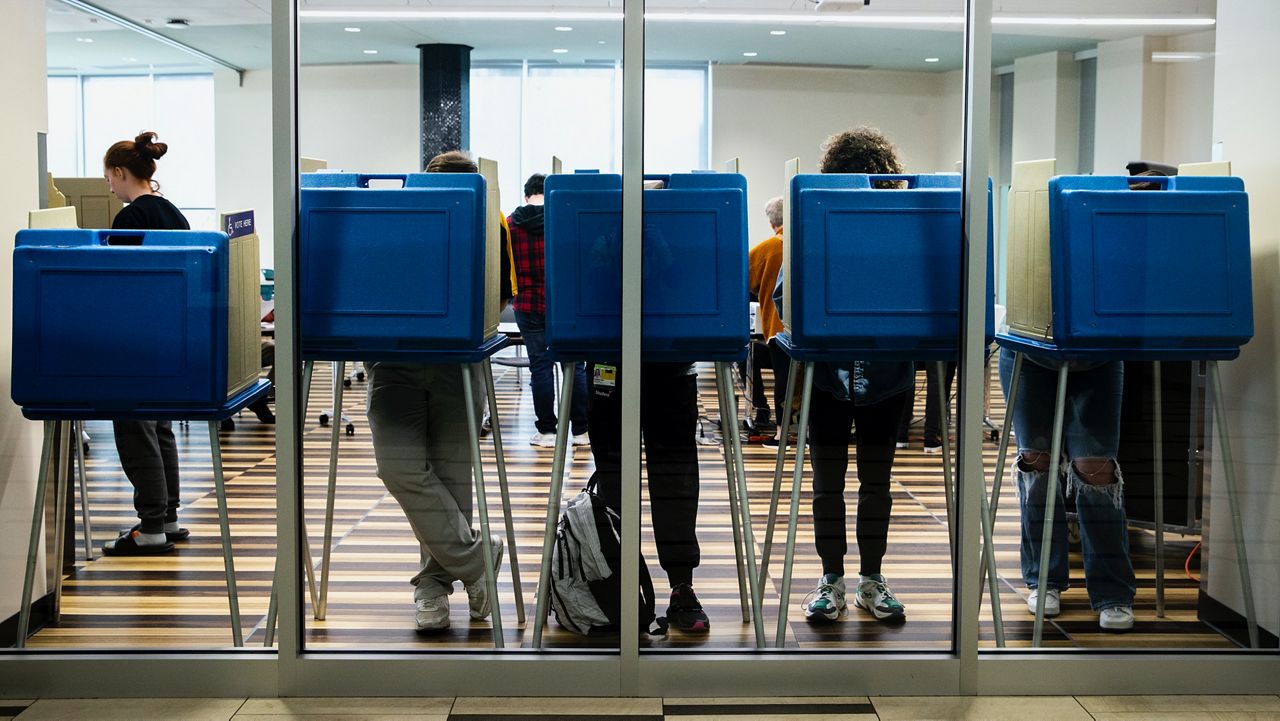Voters have become deeply discouraged about the state of America and its future, AP VoteCast shows, with high inflation and concerns about the fragility of democracy heavily influencing their decisions in Tuesday's midterm elections.
The two leading factors reflect a country in distress at a moment when control of Congress — and a choice between sharply contrasting visions of America — hang in the balance.
The detailed portrait of the American electorate is based on preliminary results from VoteCast, an extensive survey of more than 90,000 voters nationwide conducted for The Associated Press by NORC at the University of Chicago.
Half of voters say inflation factored significantly in their vote, as groceries, gasoline, housing, food and other costs have shot up in the past year and given Republicans a vehicle for criticizing President Joe Biden. The economy was an overarching concern with voters, about 8 in 10 of whom said it was in bad shape as high inflation has raised fears of a recession. Not all voters say Biden's policies caused higher prices, even if many saw it as a defining issue for the election.
Slightly fewer voters — 44% — say the future of democracy was their primary consideration. On the campaign trail, Biden has warned that Republicans are posing a threat to democracy. Many GOP leaders continue to cast doubt on the U.S. electoral system, falsely claiming that the 2020 presidential election, which Donald Trump lost, was rigged.
Since the 2018 election, voters have become increasingly demoralized as the country's political divisions have hardened. Roughly three-quarters say the country is headed in the wrong direction. That figure is higher than it was in VoteCast surveys of voters in 2018 and 2020.
Republicans are counting on voter dissatisfaction with inflation, crime and immigration to help them take control of both chambers of Congress.
With deep doubts about the economy's health because of inflation nearing 40-year highs, they've sought to frame the election as a referendum on Biden, saying that high prices flowed out of his $1.9 trillion in pandemic aid and resistance to providing more leases for oil drilling on federal land.
Biden and his fellow Democrats have argued that the U.S. middle class is poised for a renaissance because of their investments on infrastructure, computer chip production and clean energy projects. The president has said the 8.2% annual inflation is a consequence of Russia invading Ukraine in February, which caused a spike in food and energy prices. Administration officials went to great pains to lower prices at the pump, but when thinking about inflation nearly half of voters said that higher food costs were what mattered most when casting their ballots.
Inflation has been a clear blow to the well-being of many Americans. A third of voters describe their families as falling behind financially. That's nearly double the percentage of the electorate that said the same two years ago. A similar percentage say they are not confident they can keep up with their expenses.
While inflation has shaped Republican messaging in the run-up to the midterms, voters are split over pinning the blame on Biden. About half say his policies led prices to climb, while nearly as many say the inflation is due to forces outside the president's control.
Democrats also tried to tap their base's outrage after the Supreme Court overturned the abortion protections in Roe v. Wade, the 1973 decision enshrining the right to abortion. Overall, 7 in 10 voters say the ruling was an important factor in their midterm decisions.
VoteCast also shows the reversal was broadly unpopular. About 6 in 10 say they are angry or dissatisfied by it, while about 4 in 10 were pleased. And roughly 6 in 10 say they favor a law guaranteeing access to legal abortion nationwide.
Crime also was an important factor for most voters, and half say the Biden administration has made the U.S. less safe from crime.
Despite concerns about democracy, about 4 in 10 voters say they are "very" confident that votes in the midterm elections will be counted accurately, an improvement from the percentage of the 2020 electorate that said so.
Many voters came into the election with entrenched views. About half say they knew all along how they would vote, while a third decided over the course of the campaign, and roughly 1 in 10 say they made their choice in the last few days.



